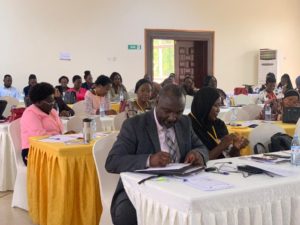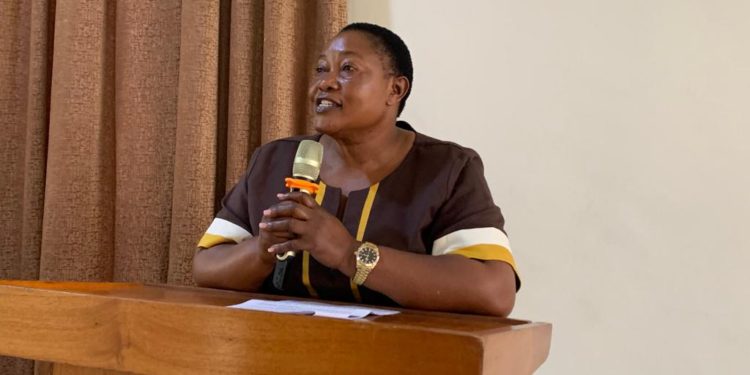The Minister for the Presidency, Hon. Babirye Milly Babalanda has criticised public servants who disassociate themselves from the National Resistance Movement (NRM) system. The Minister says such public servants forget that when the ruling party sinks, they also drown along with their colleagues in government.
“You forget that we are in the same boat. Going by the current political trend, those fighting the NRM are doing so because they do not see what the government has done. Unfortunately, they are targeting individuals and the positions we occupy including yours. So, if you allow the boat to sink, then we will all drown, even you who is saying nothing in defense of the government. We will suffer the same consequences,” she cautioned.
Hon. Babalanda made the observation today while officiating at the opening of a 4-day 3rd Administrative Officers’ Forum held at Brovad Hotel, Masaka City.

The Administrative Officers attending the workshop include; Under-Secretaries,
Principal Assistant Secretaries, Senior Assistant Secretaries and Assistant Secretaries from all government ministries, departments and agencies.
The Minister also noted that the NRM government has largely been let down by the selfish civil servants who frustrate the excellent policies crafted by the politicians.
“Currently, in Uganda; there is no political party that has solutions to the problems of our people more than the NRM. What is affecting us is the intrigue, laziness, corruption and failing to understand our roles as servants of the people,” she stressed.
“I therefore wish to emphasize here that; you as Administrative Officers, you ought to serve with passion, commitment, competence and focus, despite the different challenges that the Public Service is going through. This is because, you have a very big contribution to make towards achievement of government’s promises to Ugandans.”
Hon. Babalanda further reminded the Administrative Officers of the four core principles of the NRM which include; Patriotism, Pan Africanism,Socio-Economic Transformation and Democracy. She said if they appreciate and put to heart these four core principles, and each one of them does his/her part in implementing them; they will serve in their positions for a long time; because the party will be here to stay.
“The Four Core Principles are answer to all the needs of our people,” she emphasized.
Hon. Babalanda also explained that the NRM Government has tried to equip Administrative Officers with the necessary tools for public service efficiency and effectiveness and it upon them as public servants to ensure that the government implements the National Development Plan and the NRM Manifesto.
“His Excellency the President has always emphasized that “The strength of the NRM and its ability to govern for over three decades now is rooted in the party’s push for the population’s interests instead of focusing on individual identity”. That is why, NRM has been able to build a strong national army, bring peace, attract local and foreign businesses, produce goods and services, collect more taxes, cause socio-economic transformation and work with other African states for a strong continent.”

Nevertheless, the Minister strongly cautioned the Administrative Officers against corruption.
“As you are all aware, H.E the President is committed to the fight against corruption and has always categorically stated that he will not tolerate corruption at any level of government,” Hon. Babalanda stated, adding, “The abuse of public office for private gain erodes people’s trust in government and its institutions. Corruption disables the government’s ability to grow the economy in a way that benefits all citizens. It distorts government priorities.”
She therefore appealed to the officers to ensure that they help government clean its public service image by working in unison to kick corruption out of the country.
She also commended the State House Anti-Corruption Unit, the Inspector General of Government (IGG), The Director of Public Prosecutions (DPP) and the Anti-Corruption Court for their energy invested in fighting corruption.
“These actors have done a great deal of good, even when the general public does not get to know what they are doing because these agencies talk less and act more.”
On the other hand, Hon. Babalanda appreciated the Administrative Officers for the services they render to the country. She said without their hard work and dedication, the achievements Ugandans are currently seeing would not have come to pass.
“Please continue following the Public Service Regulations and Ethical Code of Conduct for Public Servants so as to maintain a high level of integrity in your offices.”
Additionally, the Minister expressed gratitude to the Secretary, Office of the President Hajji Yunus Kakande for promoting patriotism and professionalism among the administrators. She described him as an exceptional and experienced public servant who should be emulated.
“The Secretary, Office of the President; Hajji Yunus Kakande for Example; is always available in office on every single working day from 6.00 am to 6.00pm. Please consult him but as well emulate his method of work. He has served for very many years, rising from your levels to the apex,” Hon. Babalanda commented.
“I can confirm that I have not heard any scandal around him. I will therefore be glad if you can emulate him and in future the ‘bazukuku ba Museveni’ testify about your performance just like I am doing about Hajji Yunus Kakande.”
On his part, Hajji Kakande revealed that as the Office of the President, they have an oversight role on the whole government so they must have representatives in all the Ministries and these are the Administrative Officers.
“Hon. Minister we need to mould them because they are the ones to make good service delivery to be achieved,” he said.
Hajji Kakande also lauded President Museveni for taking a fundamental decision where he charged the Under-Secretaries with a responsibility to head departments and supervise the various functions in the respective Ministries they serve.
“I thank the President for having realised that this group is very fundamental in service delivery.This group must be looked at as partners in development and they can be used to see how the socio-economic development of this country is achieved,” the Secretary In the Office of the President observed.
“Hospital administrators should also become under the office of the President for close supervision and improve service delivery,” he added.
Hajji Kakande also suggested that the government should set up a fully functional Training Institute for civil servants in order to enhance cadreship and groom them on how to excellently execute their roles as administrators.
“Maybe we can start thinking of Kyankwanzi as where public servants can go for short course.Uganda Management Institute was a training place for civil servants but when reforms came it is now more of an academic institution. We also have a civil service college in Jinja but it lacks some facilities like accommodation.”
He further proposed that Under-Secretaries should be given first priority to advance to the level of Permanent Secretary since they have gained a lot of experience in the field.
“The tendency of getting Permanent Secretaries from other areas has not worked well. I understand that it’s within the powers of President to appoint them but he can be advised so that reforms are made,” Hajji Kakande stated.
Hajji Kakande also disclosed that last year the Head of Public Service constituted a committee (where he is part) to revamp the Administrative Cadreship and among their observations was the undermining of Under-Secretaries by their seniors.
“The Permanent Secretaries don’t delegate their Under-secretaries. When they are not around, they delegate their roles to other people but the right thing should be that when the Permanent Secretary is not around, the Under-Secretary should be in charge,” he said.
“Hon. Minister please make this group a formidable one as you have done with the RDCs.”
Organised by the Office of the President, the overall goal of the forum is to provide a platform for discussion, harmonization and repositioning of the Administrative Officers to participate in the transformation of the Public Service.
ENDS















